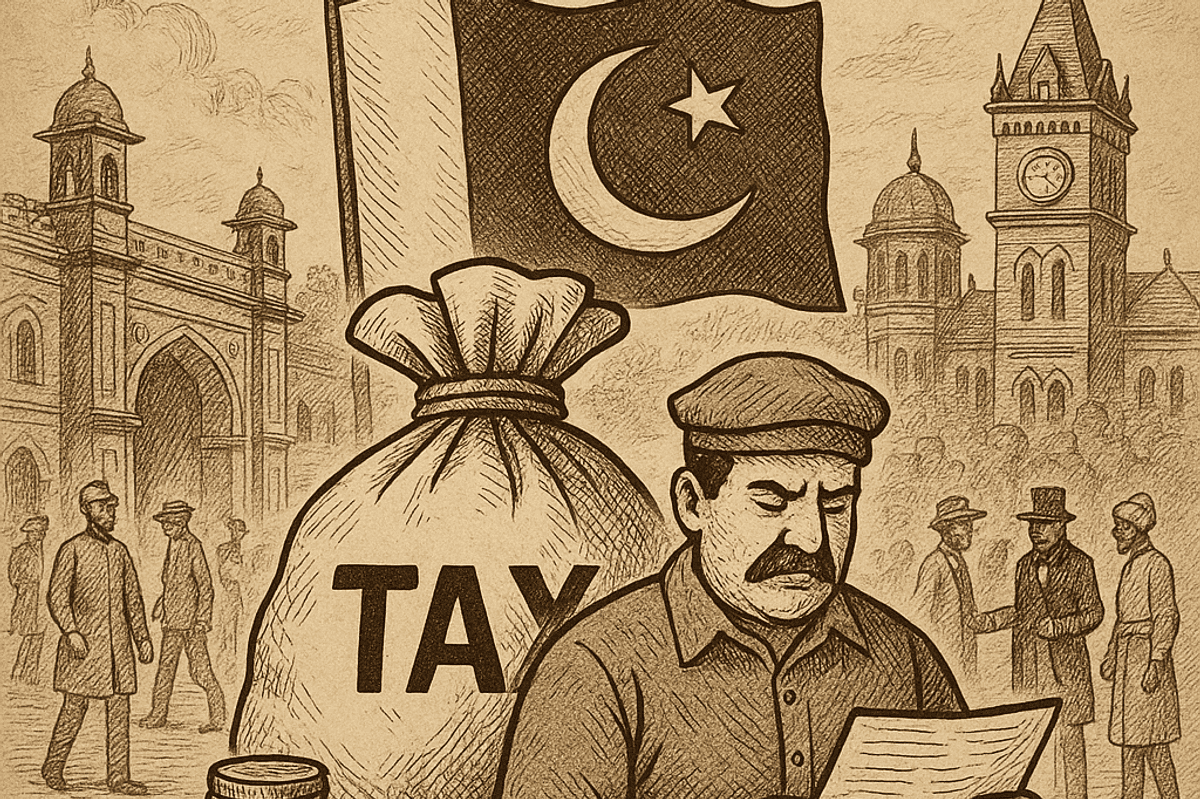Pakistan’s tax system and the colonial hangover
If Pakistan is to move toward sustainable growth and meaningful reform, it must abandon colonial-era governance practices
Muhammad Azfar Ahsan

What Pakistan urgently needs is a tax culture rooted in trust, digital transparency, and predictability.
Nukta
History casts long shadows over the present. Power, once seized through conquest, is now often preserved through inertia, embedded in institutions that were never truly reimagined after independence.
A painting titled “Tax Collector in Pre-Partition Indian Subcontinent,” displayed at the Federal Board of Revenue (FBR) headquarters in Islamabad, portrays colonial-era tax collection under the East India Company. Intended as a reflection on historical injustice, it now feels unsettlingly relevant in the year 2025.
The imbalance of power between citizens and the state remains. It is no longer imposed by foreign rulers but sustained by our own institutions. What was once enforced through imperial decree now echoes through bureaucratic discretion, blurring the line between authority and authoritarianism.
Pakistan is striving for economic revival through increased investor confidence and fiscal reform. The role of the state’s machinery must therefore reflect compassionate understanding, necessary support, and consistent facilitation. Yet, budget after budget, we witness a stagnant pool of taxpayers facing increasing pressure to conform to often unjustifiable hikes and burdens.
To complete the picture, the FBR has now been granted extraordinary powers under Section 203A of the Income Tax Ordinance, empowering tax officers to arrest chief executives, directors, and employees without prior judicial approval or due process. The official justification offered for these powers is the need to curb tax evasion and enhance compliance. But enforcement without reform is not reform; it is coercion.
This inversion of justice, where the presumption of innocence is replaced by a presumption of guilt, generates fear instead of fostering cooperation. It undermines the trust essential for a functioning economy and raises serious constitutional concerns. Article 10A of the Constitution of Pakistan guarantees every citizen the right to a fair trial and due process. Are we setting a dangerous precedent where fundamental rights are subordinated to bureaucratic discretion? I am reminded of the Rowlatt Act of 1919, a colonial ordinance that similarly compromised civil liberties under the guise of control.
Meanwhile, the misuse of taxpayer money continues unabated, fueling fleets of luxury vehicles, armed escorts, and personal comforts for officials, while disregarding the very individuals who sustain the economy: taxpayers, entrepreneurs, and job creators. This reflects a governance style where power is wielded, not exercised with accountability; where authority is asserted, not justified.
A recent example illustrates the growing disconnect between state and business. Senior executives from Pakistan’s leading telecom companies, who collectively contribute over four hundred billion rupees annually in taxes, were invited to meet the FBR Chairman. After waiting for over an hour, they were informed, without explanation or apology, that the meeting would not take place. This was not a mere scheduling conflict; it was a symbolic dismissal of the businesses that keep Pakistan’s economic engine running. Within the corporate community, the incident has deepened an already growing sense of disillusionment and institutional fatigue.
Pakistan’s tax-to-GDP ratio remains below 10%; one of the lowest in the region. Structural deficiencies, combined with a pervasive lack of trust in the tax system, are compounding the issue, new investors hesitate, existing ones question their future in the country. Confidence in Pakistan’s potential is eroding. And as if these cracks were not already visible, we have now introduced, rather arbitrarily, a provision that may well scare investors away. Compliance should not and cannot become a casualty. But unless this trajectory is reversed, that is exactly where we are headed.
If Pakistan is to move toward sustainable growth and meaningful reform, it must abandon colonial-era governance practices. Public officials must act as servants of the people, not as rulers. Business leaders are partners in progress across the globe. They cannot be treated as suspects. Institutions tasked with national development must support and protect business interests with fairness, humility, and accountability.
What Pakistan urgently needs is a tax culture rooted in trust, digital transparency, and predictability. Enforcement must be rule-based, not driven by personalities. Policymaking must empower the formal economy, not penalize it. Engagement with the private sector should be founded on respect and reciprocity, not intimidation.
Countries like Indonesia, Vietnam, and Rwanda have demonstrated how building digital tax ecosystems and offering structured incentives for formalization can expand tax bases without alienating taxpayers. Pakistan must learn from such examples.
Above all, every action by the state must align with constitutional guarantees, not override them. Until that transformation occurs, and that painting reflects only a chapter of history and not the conduct of our present, these so-called reforms will remain hollow slogans.
Trust must become the cornerstone of governance for economic ambitions to succeed. The business community, policymakers, and civil society must come together to demand a tax regime that reflects the values of a democratic republic.
The rebellion of 1857 was not against rule; it was against exploitation. Enforcement without reform, respect, and due process is a recipe for rebellion. Pakistan must find its way out of crisis through fair and equitable taxation. And that will only happen if a collaborative and democratic framework surrounds those who generate wealth for the country, and humility and accountability define those who manage public affairs.
*The writer is a public policy advocate, business strategist, and Pakistan’s former Minister for Investment and Chairman of the Board of Investment. He writes frequently on issues related to the economy, governance, and society.
*The views and opinions expressed in this article are those of the author and do not necessarily reflect the editorial stance of Nukta.







Comments
See what people are discussing